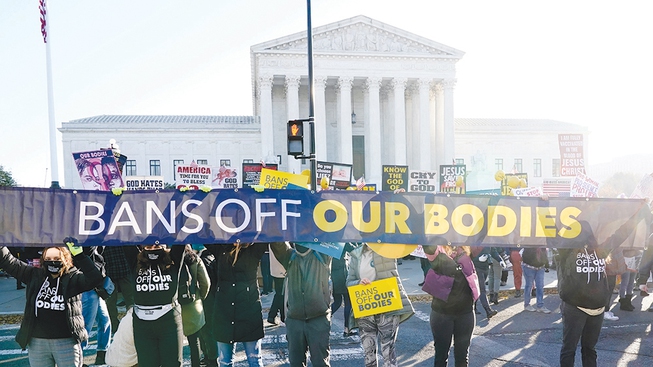
Jacquelyn Martin / AP
People demonstrate Wednesday, Dec. 1, 2021, in front of the U.S. Supreme Court building in Washington. Inside the court Wednesday, justices heard arguments in a case from Mississippi, where a 2018 law would ban abortions after 15 weeks of pregnancy, well before viability.
Friday, Dec. 3, 2021 | 2 a.m.
As the U.S. Supreme Court mulls the fate of abortion rights, advocates in Las Vegas are discussing the possible effects of the case and what it could mean for accessing abortions in Nevada.
Local organizers with Planned Parenthood and Make It Work — a nonprofit that organizes women of color around economic issues — along with pro-choice attorneys and an abortion patient spoke Wednesday to about two dozen people about Dobbs v. Jackson Women’s Health Organization, the case heard earlier Wednesday at the Supreme Court.
Speakers all agreed the Mississippi case seemed poised to gut or overturn the high court’s 1973 landmark ruling in Roe v. Wade, which effectively legalized abortion in the U.S.
If the Mississippi law is upheld, it would also undo the 1992 Supreme Court ruling in Planned Parenthood v. Casey, which reaffirmed the Roe ruling.
“Roe and Casey are dead. They’re going away,” said Bradley Schrager, the lead politics and government attorney at Wolf, Rifkin, Shapiro, Schulman & Rabkin LLP. “All the things we’ve talked about forever about how that day may come — it’s come.
“We have about a seven-month window until the opinion comes out,” Schrager said. “There are going to be vast deserts of reproductive (health care) and accessibility throughout this country. All those terrible stories are going to happen to tens of thousands of women across this country.”
The court’s nine justices on Wednesday heard arguments from the state of Mississippi, which argued the court should overturn Roe altogether, while lawyers from the state’s sole-remaining abortion clinic argued why the state law banning abortions after 15 weeks should be ruled unconstitutional, as it has been ruled in the lower courts.
That’s different from the precedent set in Roe v. Wade, which protects the right of abortion until viability, normally around 24 weeks of gestation. A full-term pregnancy is 39 weeks.
Legal scholars and pro-choice advocates have signaled concern the court even took up the case. The court has a 6-3 conservative majority — with three justices appointed by former President Donald Trump.
A decision isn’t expected until June.
“The majority of the court seems pretty darn ready to overturn (nearly) 50 years of precedent and unravel the core principles of Roe,” said Jenny Lawson, the vice president of organizing campaigns for Planned Parenthood Votes Nevada, the entity’s political arm in the state.
“It’s highly unlikely they’re going to go out and say that Roe v. Wade is overturned. They’re just not going to say those words,” she said. “But they are going to render it even more meaningless than it already is and really set the stage for states to do whatever they want.”
The panel also featured a short video call with Nevada Democratic Sen. Catherine Cortez Masto and pre-recorded messages expressing solidarity from Democratic Gov. Steve Sisolak and Attorney General Aaron Ford.
“We’re facing by far the biggest threat to Roe v. Wade in three decades,” Cortez Masto said, referencing the Planned Parenthood v. Casey ruling. “So, I want to join you to sound the alarm and support all of you as we work to protect the health of America’s women. … We have to stop treating women’s health care as optional.”
Cortez Masto noted that while Congress had not passed a law at the federal level protecting the right to seek an abortion, at least 26 states have passed “trigger laws” that would immediately ban abortions in those states if Roe v. Wade is overturned.
A’Esha Goins, an organizer with Make It Work Nevada, said abortion bans disproportionally affected the poor and communities of color.
“Anytime when we start talking about limiting access to anything, underserved and Black people and Latinx persons are most affected,” Goins said.
Cortez-Masto told attendees she was urging Congress to pass the Women’s Health Protection Act, which she said would “outlaw bans and other medically unnecessary restrictions” on abortion across the country.
The bill, which was introduced by California Rep. Judy Chu, passed the House on Sept. 24, but faces an uphill battle in the Senate.
Sisolak touted his 2019 signing of the Trust in Nevada Women Act, which removed requirements that abortion patients be told of the “emotional implications” of the procedure, as well as eliminate criminal penalties for anyone who supplies or administers abortion medication without the advice of a doctor. It also eliminated a requirement that doctors ask patients about their marital status and age before performing an abortion.
In 1990, Nevada voters passed a statewide ballot initiative known as Question 7, which permits a woman to have an abortion within the first 24 weeks of pregnancy. The referendum passed easily, with 63.5% voting to approve the measure.
But still, Schrager warned even that measure could be undone.
“I would urge caution against complacency, because you’ve all seen the ‘red wave elections,’" Schrager said. “If red wave elections could sweep out entire congressional delegations and flip assemblies that haven’t been flipped in 50 years, it can certainly flip a vote regarding that particular statute.”
“All it would take would be the timing and the will of our adversaries to do so,” Schrager said. “I think it would be wrong to think that our adversaries aren’t planning such things. So it’s important to stay on guard all the time regarding those things, but we’re in pretty good shape.”
